Joanna Cifredo, 36, is a transgender activist and transgender woman from Bayamón, Puerto Rico. After living and working in the United States for a number of years, Cifredo moved back to Puerto Rico after Hurricane Maria in 2017 to help the LGBTQ+ and trans communities. She has been going back and forth between Puerto Rico and Washington, D.C. for her activism work, but now resides on the island.
Puerto Rico is a small island with a population of 3.2 million people, just under Los Angeles’ population of 3.9 million people and California’s state population of 39 million people. The trans community in Puerto Rico and the trans community in the United States are vastly different in numbers.
In a study done by the William Institute at the University of California, Los Angeles (UCLA) in 2022, it is estimated that 49,100 people between 13 and 17 years of age identify as transgender, and as do 150,100 of the state’s adult population.
“The trans community in the United States has more soldiers to fight for them versus the trans community in Puerto Rico. The trans community is tiny here. The population as a whole is very impoverished and in need of resources,” Cifredo said.
Cifredo’s activism work dates back to her living in Washington, D.C., for six and a half years during the Obama administration. A policy analyst by training, she has done work with ICE as a partner under Homeland Security to help immigrant women tell their stories, as well as with the Department of Justice and the Bureau of Prisons to help trans women who are in male prisons. She started her work in activism as a millennial seeing the need to be a voice for the voiceless, especially in the Latino community.

Joanna Cifredo
“There is a large age gap in the trans community between those 25 and younger and those 50 years and older. So I often feel like I am the bridge between the two generations,” Cifredo said. She described how she feels it is her responsibility to translate each generation’s point of view to the other. But she credits the elders before her because “without them, my journey would have never started,” Cifredo said.
Her work in Puerto Rico started with policy work with coalitions after Trump was elected. One fight was to get Senate Bill 485 passed. This bill would have established a Bill of Rights for LGBTQ+ people living and visiting Puerto Rico. Unfortunately, the bill did not pass, but the fight continues.
Cifredo has testified against the House and Senate to defend trans women and youth and partition parents against the right-wing party on many other occasions.
“There was a bill presented by a right-wing political party in Puerto Rico that, if it had been made into law, the parents of trans youth who support them in their transition would’ve been classified as childhood sexual abusers,” Cifredo said. “Their doctors would’ve lost their licenses and been jailed, and children obviously would’ve been taken from their families.”
Cifredo was the one who brought people together to put a stop to it and they were successful.
The fight for acceptance of not only the LGBTQ+ community but also the trans community is a lifelong battle that many are willing to fight hard for. This one month in the summer is a time for the communities and allies to rejoice in the love they share and accept while acknowledging that there is still a big fight ahead of them. Cifredo’s is just one voice making herself heard, set on improving the world around her.
CALÓ NEWS sat down with Joanna Cifredo to talk about her journey and the work that she has done as a transgender activist.
Responses have been edited for clarity and brevity.

Joanna Cifredo
JOANNA CIFREDO, 36, PUERTO RICAN, BAYAMÓN, PUERTO RICO, TRANSGENDER ACTIVIST, SHE/HERS
HOW HAS YOUR JOURNEY IN THE TRANS COMMUNITY INSPIRED YOU TO ADVOCATE FOR OTHERS?
My story is only possible because previous generations of activists fought and, in many cases, gave their lives. So, a story like mine can’t even be a possibility. I feel an immense responsibility to do everything I can with my time on this earth to make it easier for the next generation. In Puerto Rico, for example, in terms of the trans community, there’s a huge age gap because a lot of the millennial population has left. You have a lot of people who are 50 and up, and you have [people who are] 25 and younger. There is a huge gap between 25 and 50, so I often feel like a bridge between two generations. I have the institutional memory to remember what it’s like to walk the stroll and the different modes of survival that we had as trans women back in the day before there was a transgender tipping point. Still, I’m also young enough that I’ve been able to benefit from a lot of the gains that we’ve made over the last decade. I see it as my responsibility to be that bridge and act as a translator across generations. Often, I feel like I have to explain the point of view of older trans women to the younger trans kids. Sometimes, I feel like I have to explain the views of younger trans and queer populations to older trans people because I can access both groups in both spaces. Many of my friends are young, but I also have a lot of trans friends who are much older.
WHAT KIND OF ADVOCACY WORK HAVE YOU BEEN DOING? HAVE THEY HELPED THE LGBTQ+ COMMUNITY?
I’m a policy analyst by training. Before moving back to Puerto Rico, I lived in Washington City for six and a half years during the Obama administration. During that time, I worked a lot with, for example, ICE under Homeland Security to end trans detention. We even brought a group of trans women immigrants to ICE to tell their stories. At the time, I also met with the Bureau of Prisons to follow up on cases of trans women housed in men’s prisons. I also worked with the Department of Justice to follow up on cases of trans femicides. I worked with other coalition partners to try to pass the Equality Act.
I lobbied Congress for gun safety legislation, The Quality Act, student protection and immigration reform. I worked with the Obama administration to address different issues impacting trans people. We worked with the Department of Education to develop Title IX guidance for schools proactively supporting their trans student populations. We worked extensively with different states and municipalities to create gender-inclusive identity documents. Then, Hurricane Maria happened and I decided to move back to Puerto Rico. Before my move, Trump got elected, and I started doing more communications work. I worked with GLESN, an organization supporting LGBTQ students in 12th grade, as their media relations manager. I worked with many notable queer and student activists nationwide. I gave them all the media training. I would pitch their stories, connect them with reporters and follow up with them. I would give them mentoring and look out for them. I enjoyed that. One of the things I want to do is work with young trans people. It’s something I’ve done throughout my career. I’m a camp counselor at a trans camp in the summer. I just really love supporting young trans and queer kids. Providing safe spaces where they feel they could tell their story, talk about their experiences and what they’ve been through because, often, it’s queer young people. We go through a lot. It’s nice to talk to people who know your experiences. Not every school has a person who understands.
I moved back to Puerto Rico and did the same work I’ve been doing; policy work. We’ve been pushing for Senate Bill 485 to establish a bill of rights for LGBTQ+ people living and visiting Puerto Rico. I’ve had to give testimony. I’ve testified before the House and the Senate on different bills and had to testify to defend trans women in our healthcare, trans youth and our partition patients. There was a bill presented by a right-wing political party in Puerto Rico that, if it had been made into law, the parents of trans youth who support them in their transition as childhood sexual abusers. Their doctors would’ve lost their licenses and been jailed, and children obviously would’ve been taken from their families. It was an extreme bill. Gender-affirming care would’ve been banned for minors. I was the one who organized a committee to put an end to it, and luckily, we were successful.
I decided to bring attention to the crisis by demanding Senate Bill 485’s approval. The way I chose to do that was to walk from the town where Michelle Shamo Bargas was murdered, which is a town on the southwest side of Puerto Rico, to the capital. Over [the course of] one week, I walked 120 miles with my trans sister, Joan Lee. I did a press release and didn’t know if I could do it physically, but we did. We hosted four vigils along the way in different towns where trans people had been murdered. And we held two college rallies to discuss the urgent need to establish a bill of rights for LGBTQ+ people. That was what we did, we ended with a massive rally for equity because the walk was called “Walk for Equity.” We arrived at the capital on the day that was the one-year anniversary of her death. Unfortunately, we failed to pass the bill but are still working on it. Those working in public policy know that policy moves like molasses when trying to pass a bill. That’s why you have to create movements. That’s why we do everything we do, because you have to move to change the law.
ARE THERE ANY DIFFERENCES BETWEEN THE TRANS COMMUNITY IN PUERTO RICO AND THE U.S.?
One of the challenges we have in Puerto Rico in comparison to the U.S. or other countries, which are much more advanced and progressive regarding trans rights, [is that] we’re a small island of three million people [compared to] Argentina, Chile, Colombia, Mexico, Thailand and The Philippines. So you just have more soldiers. You have way more trans people, so it’s easier to do things because you have more bodies. In Puerto Rico, it’s just very hard because we’re a tiny population. The population as a whole, is very impoverished and needs more resources. That’s an island-wide problem. Then that’s exacerbated when we’re talking about a community that experiences social marginalization. Then the small population also becomes increasingly smaller because many people leave. You could go to New York, and Medicaid will pay for your whole transition. So, a lot of people leave. And those of us who stay in Puerto Rico must do all the work. Sometimes, someone’s murdered, and the same three people, two people, or one person organize [against] it. If one of us, for example, Michelle Ramas’ murder, had I not walked and gotten to the capital, the anniversary of her death would’ve come and gone as if nothing had happened. We had that bill, and I was the one who organized it. I was the one who found out that the bill was even being presented in the community. I was the one who picked it up. If I hadn’t found out about it, there would not have been as big of an outcome as there was.
Whereas in the United States, and this is the difference between cultures, there’s more of a culture of political organizing. In Puerto Rico, there are a lot of protests. But there’s not necessarily political organizing because many Puerto Ricans, especially young people, don’t attend public hearings. They need help understanding the legislative process. They know how to plan a protest, keep people safe, and do it. Their approach is very anarchist, there’s not a lot of organizing in the sense of “How can we change public policy?” The only way one can change public policy is by engaging in government. Because Puerto Rico has a territorial relationship with the United States, many younger people think they shouldn’t participate in the colonial elections, which is not the smartest thing. I hear and understand them, but whether we like it or not, it’s the system we have. So, whether you engage in the system or not, someone is getting elected, and that person is going to have to be able to make decisions over your health care, your education and your rights.
CAN YOU DESCRIBE THE STRUGGLES OF THE TRANS COMMUNITY? ARE THERE ANY DISADVANTAGES FOR LATINOS AND PEOPLE OF COLOR IN THE TRANS COMMUNITY?
Everything is a trans issue. Certain things were targeted. For example, right now, healthcare is being targeted in many states, and even in states where we do have healthcare, it’s not accessible. In Puerto Rico, we have gender-affirming clinics where you can get hormones, but they’re less than a handful. There are parts of the island that are completely inaccessible. If you don’t have a car, there’s no way that you can go to your appointment because we don’t have an island-wide bus system. There’s no way to get from one side of the island to another if you don’t have a car. Even if you theoretically have certain rights, if you don’t have access to those rights, you don’t [have them].
Right now, there’s a whole political apparatus up against us. Conservatives have long used the LGBTQ+ community and homophobia to fear monger. This goes back to George H.W. Bush. Since 2015, marriage equality has been the law of the land. The most significant thing was marriage equality. We must protect the sanctity of marriage because conservatives, or those who oppose civil rights, will often use the language that they’re protecting women and children, or they’re protecting women’s sports. They’re saving children from being mutilated or from groomers because it makes them feel righteous, as if they’re doing something good.
Meanwhile, they don’t care about queer kids. So it’s a lack of healthcare and a genuine misunderstanding of the community. There’s this kind of big, scary boogie man. I’ve even noticed that people who know me are falling prey to some of these talking points and these misconceptions of trans people. I have to say to them, “But you know me.” There’s also just a lot of economic inequality. A lot of trans people are underinsured or unemployed. In the United States, there’s a vast sea of financial despair. I think there are 15 million Americans who can’t fill their prescriptions. So when we talk about the trans community, we’re talking about all the social issues amplified because we’re talking about a community that has, historically speaking, specifically, when talking about trans women of color, we’re talking about compounded oppressions. We’re talking about intergenerational marginalization. We’re talking about structures like racism and immigration status that make it much harder for communities of color to prosper and thrive. Then, when we talk about queer people, and specifically trans people and specifically trans people of color, more specifically trans women of color, and trans stem sub-color, again, you’re talking about compounded, oppressive structures that just make it harder to thrive. We, as trans women, are survivors. We are resilient. We defy the odds regardless. It’s not easy because, often, as trans people, specifically trans women of color, we don’t complain. We just do what we must do.
HOW HAS FLORIDA’S “DON’T SAY GAY” LAW AFFECTED THE LGBTQ+ COMMUNITY, ESPECIALLY DURING PRIDE MONTH?
All across the country, there’s anti-trans legislation going on and conservatives are presenting anti-trans legislation at the local level and the state level; it’s exhausting. It’s like we’re playing whack-a-mole. I believe that they intend to exhaust us into submission. This is a lifelong project and sometimes thinking about it that way is exhausting. It’s scary. But our generation, specifically, all of us in general, have to realize that to save this planet, for us to save ourselves, for us to save humanity, and to address the climate crisis, that’s a lifelong project. For us to transition from a dirty economy into a clean economy. Let’s actually think about the climate crisis and take it seriously. The level of commitment required from everyone to address the climate crisis will require us to become different people. We need to start thinking about our lives in that context and what we dedicate our lives to and realize that this is something other than what will get solved in more than one election cycle. We need to look into the future. We need to think about the big picture. We must also think outside ourselves; no generation should live only for themselves. No one, no individual, should either. We all have a collective responsibility to our ancestors and those who will come after us to do everything possible to leave this world better than we found it.
The state of North Carolina held an emergency legislative session, not to address gun violence or the climate crisis, but to make it so that trans people could not use the bathroom according to their gender identity. “We cannot allow men into women’s restrooms because we must protect women and children” Remember, they always use that language of protection. And it worked for them. They won the House, the Senate and the presidency. They won many elections across the country and raised millions of dollars for their cause, using trans people as scapegoats, and now they’re doing it again. They’re going after trans kids because, at this point, they’re posing themselves as if they’re protecting vulnerable children. It’s all just stuff that they make up, but it has real material consequences in the real world for trans and queer people all across the country.
IN RETROSPECT, WHAT IS YOUR TAKE ON HOW THE LA DODGERS HANDLED THE CANCELLATION AND THE REINSTATEMENT OF THE INVITATION TO SISTERS OF PERPETUAL INDULGENCE? AND WHAT LESSONS SHOULD WE LEARN FROM WHAT HAPPENED?
This is a time when allies need to be allies. Right now, there’s all this boycotting going on, and it’s not just the Dodgers; it extends far beyond that. Bud Light, Chick-fil-A, and all these Pride collaborations are now getting criticized or being boycotted. This is when companies that say they support the community need to show up. This is the time when not just companies but also organizations, institutions and individual celebrities need to speak up because the reality is that the temperature is being raised. There are a lot of young trans people who are committing suicide because they just can’t deal with this. For a lot of conservatives, this is just a game. To them, it’s just a political tactic so that they can win elections. They don’t care about these kids because if they did, they would do something to protect them when they’re in their classrooms, but they don’t care. They don’t care to protect them from a bully or a gunman. These are conservative people who are operating in good faith. They don’t know anything about the Sisters of Perpetual Indulgence. The Sisters of Perpetual Indulgence have existed for well over 20 years. I remember seeing them at Pride when I was younger, and I’ve seen them throughout my life. They are the ones calling out the Catholic Church for its wrongdoings. People want to talk about how it’s offensive. You know what? I’m offended that the Catholic Church has become the largest pedophilic institution in the history of humanity. I’m more offended by that. That the Catholic Church has been intentional, time and time and time again, intentional in trying to cover up countless cases of abuse against children by priests. None of those priests were transgender. Despite the mountain of evidence against the Catholic Church, guess what? We don’t create laws to prevent Catholic priests from going into bathrooms.
WHAT DO YOU HOPE FOR IN THE FUTURE OF THE LATINO LGBTQ+ COMMUNITY AND YOUR WORK?
I hope for a future in which all LGBTQ+ people and all people have the necessary resources and support to spread their wings and soar, so they can thrive and reach for the sky. I dream of a future of abundance. I dream of a future where you can study wherever you want, with free tuition. Where we’re able to be creative, where we’re able to create, where we’re able to relax, where we’re able to celebrate, be happy. Where we’re able to heal and love one another. A future where there’s peace. We need to talk about peace more. I dream of a future where we can be the stewards of peace that we truly are and were created to be. We are those healers. We are those visionaries. We are those manifestations. If society would let us be and thrive, everyone would benefit. Everyone would benefit because we subconsciously benefit from the liberation of those around us. As we liberate ourselves, we inspire those around us to liberate themselves.
When we talk about trans rights and say trans rights are human rights, trans rights are not competing with human rights, like women’s rights, for example. I believe that women are physically capable of doing anything men can do. This idea that “men have a biological advantage, that they’re just stronger,” and “If we allowed trans women to compete in women’s sports” … listen, I believe that the difference, the disparity between male athletes and female athletes is just because we don’t socialize females into sports to the same degree as males. If we socialize girls in support of sports and support female athletics the way we do male athletics, I believe athletic achievement among females would soar. Allowing trans women to compete in female sports, I don’t believe, will be bad for female sports. It will be good because I think those female athletes will be so driven. To want to prove to them that they can beat any person because they are so confident in their capabilities, and as sports become more female, sports become more competitive.
I believe in a future where we have more access as people to different spaces, where we expand the concepts of gender and our understanding of gender and the ways in which you can move through the world, and where we expand our idea of relationships and love.

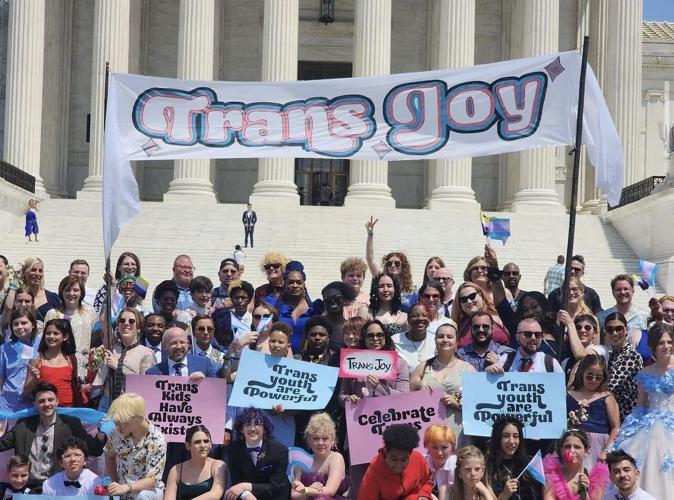
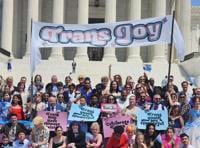

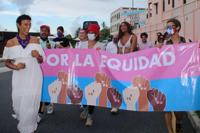



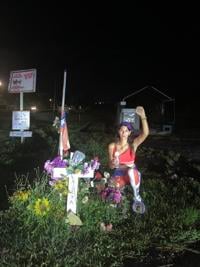





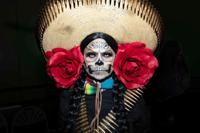



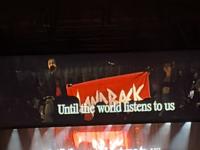
(0) comments
Welcome to the discussion.
Log In
Keep it Clean. Please avoid obscene, vulgar, lewd, racist or sexually-oriented language.
PLEASE TURN OFF YOUR CAPS LOCK.
Don't Threaten. Threats of harming another person will not be tolerated.
Be Truthful. Don't knowingly lie about anyone or anything.
Be Nice. No racism, sexism or any sort of -ism that is degrading to another person.
Be Proactive. Use the 'Report' link on each comment to let us know of abusive posts.
Share with Us. We'd love to hear eyewitness accounts, the history behind an article.